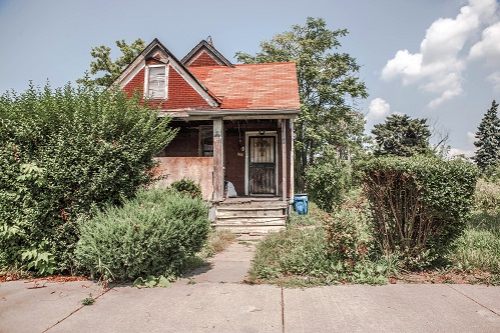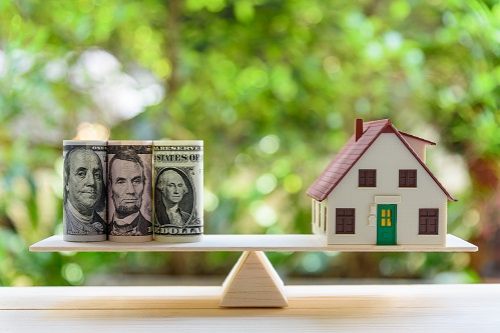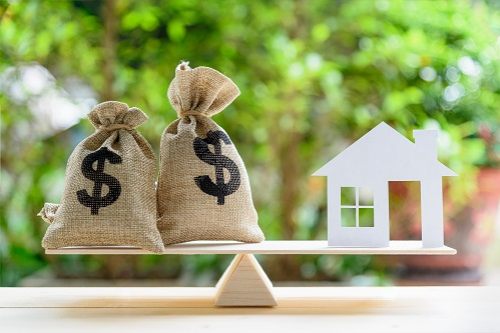- Why did my homeowners insurance go up?
- Your insurance company raised its overall rates
- Filing a claim may increase your rates
- Pools, trampolines and wood stoves
- Dogs considered high-risk for biting
- You've made improvements to your home
- Inflation affected the cost of rebuilding
- Your credit score dropped
- How to lower your home insurance rates
Why did my homeowners insurance go up?
Here are some of the common reasons why home insurance rates increase:
- Your insurer raised rates to cover its cost of doing business due to increased risk
- You filed a claim or live an area where many others have
- You added a pool, trampoline or woodstove
- You’ve added a certain breed of dog to the family
- You built an addition or did a major renovation
- Inflation
- Construction costs in your area increased
- Your credit score changed for the worse
While the impact of each is different, they can all result in higher home insurance rates.
Your insurance company raised its overall rates
Insurance companies are businesses, so naturally, they need to make a profit to stay in business. That means in some cases your rates will increase because your carrier is charging more to cover their own increasing costs. The frequency and severity of claims paid out by insurers has a significant impact on their bottom line, and the average home insurance claims cost has been steadily trending upward.
Severe weather, wildfires and the cost of construction materials all contribute to higher claim payments, an in return to increases in home insurance rates. So, while you may have done nothing different, your rates are still affected by the insurance industry's costs in general.
Filing a claim may increase your rates
When you file a claim to repair or replace your home, it’s likely your rates will increase. How much your rates go up for filing a home insurance claim will depend on whether it was a minor fix or a major replacement or rebuild.
Here is how much home insurances premiums increase, on average, for common claims.
| Claim type | Average % increase | $ increase | Average % increase for two claims | $ increase |
|---|---|---|---|---|
| Fire | 28% | $697 | 55% | $1,330 |
| Theft | 24% | $608 | 45% | $1,128 |
| Liability | 24% | $606 | 46% | $1,161 |
| Water | 25% | $614 | 46% | $1,108 |
| Medical | 17% | $412 | 25% | $722 |
| Weather | 16% | $382 | 29% | $596 |
You may have not filed a claim yourself and are still seeing higher rates due to claims. That’s because what you pay is also impacted by the severity and frequency of claims filed by your neighbors. If you live in an area prone to theft and severe weather damage, your insurance may go up even if you haven’t filed a claim but those in your community have.
The claims history on your property is also taken into account.
Pools, trampolines and wood stoves
Maybe you’ve added a swimming pool, trampoline or wood stove to your property. These are called attractive nuisances by insurance providers. Your insurer will consider your home to be a higher risk compared to homes without these things. That means you may see your homeowners policy rates rise.
A pool or trampoline will increase your rate by an average of 8%, or about $155 a year. A woodstove in your home ticks up costs by 4%, or about $90 a year. If you have added one of these to your home, you may be tempted not to tell your carrier to avoid paying more. However, failing to notify your insurer means if there is an injury or damage done from one of these items, you won’t be covered and will have to pay for the repairs yourself.
Dogs considered high-risk for biting
Dog bite claims are common and costly. According to the Insurance Information Institute and State Farm:
- There were 22,658 dog bite claims in 2024.
- The average cost per claim increased by $10,727 in 2023 to nearly $70,000 in 2024.
- Dog bite claims cost homeowners insurance companies $1.57 billion in in 2024.
So, if you’ve added a dog to the family, depending on the breed, your state laws and your insurance company, you may also pay more. Some insurance providers won’t boost rates for any type of dog breed, while others do, or may deny you coverage altogether. Two states, Pennsylvania and Michigan, however, have laws prohibiting insurance providers from denying or canceling coverage for specific breeds.
Like trampolines, woodstoves and pools, you should notify your insurance agent or company if you’ve adopted a dog, to be sure it isn’t a breed deemed high-risk.
You've made improvements to your home
In general, if your property value goes up, you may see an increase in insurance costs. It’s important to note that insurers base the value of your home on what it would cost to repair or build it with similar materials, not what you would sell it for on the market. Typically, renovations, like additions and renovations improve the value of your home, so you are likely to see an increase.
One factor that affects homeowners insurance rates is your home’s square footage. So, for example, if an addition expands the footprint of your house, your rates may go up. Or, let’s say you remodeled your kitchen. It will cost more to replace the new -- and more expensive – amenities, per square foot, so you may see a hike in your rates.
Inflation affected the cost of rebuilding
You may find your home insurance keeps going up even if you haven’t made any changes to your property. Inflation is one big reason why premiums may increase. The cost to replace your home’s contents or repair the home will be more this year than it was last year. So, for example, if you filed a claim to repair or replace your belongings three years after you bought a policy, the cost to your insurer will be more than when your coverage went into effect. Insurance companies use the Consumer Price Index to measure inflation and then adjust their rates based on that information.
Your credit score dropped
When you file a claim, your home insurance premiums are likely to go up more than almost anything else. The one surcharge higher than filing claims is if you have bad credit. Nearly every state allows insurers to use a person’s credit history when devising rates. Not every insurer considers credit, but those that do raise rates substantially for people with poor credit.
The national average rate for homeowners with bad credit is $4,400, $2,494 more than those with excellent credit. Some states, including California, Hawaii and Massachusetts, don’t allow the use of credit scores for insurance.
How to lower your home insurance rates
Now that we’ve covered common reasons for you insurance premium increasing, let’s look at how some factors that affect home insurance rates can result in rates going down. While many things about your home aren't things you can change, like how far you are from a fire station or the age of your home, there are a few things you can do to earn a discount on your home insurance. Here are some changes you can make to reduce your rates:
- Install a security system
- Make upgrades to avoid damage, such as hail-resistant roofing, fire-resistant materials or hurricane shutters
- Add a smoke alarm that connects to the fire department
You can also make repairs to your property and work to improve your credit score to get lower rates. Here are a few more tips for lower rates
Comparison shop. Comparing home insurance company quotes at least once a year prior to renewal is the best way to save money on your policy. The price for the same house and amount of coverage will vary significantly among insurers. That’s because each uses its own unique method for assessing your homeowner profile and associated risk and determining what you pay. You should compare quotes from at least three companies for the same amount of coverage.
Raise your deductible. Choosing a higher deductible typically lowers your premium on insurance policies.
Sources:
Insurance Information Institute. "Triple-I/State Farm: U.S. Dog-Related Injury Claim Payouts Hit $1.57 billion in 2024." Access May 2025.




